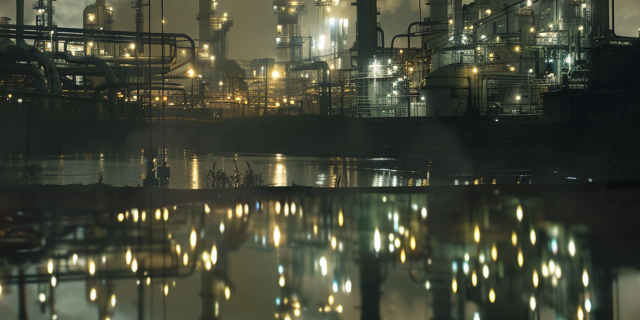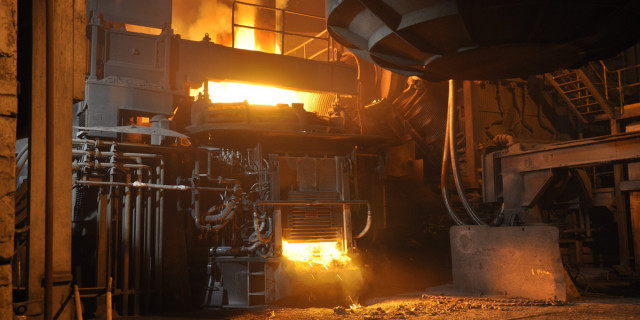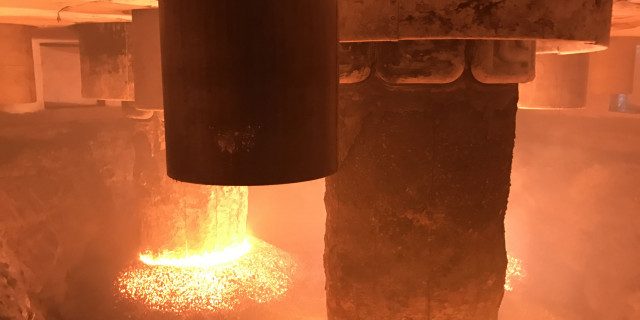
Metal recycling: a pioneer for the circular economy
Metal recycling is a central component of a sustainable economy and contributes significantly to the conservation of resources and the environment. In a world where raw materials are becoming increasingly scarce and the demand for metallic materials is constantly growing, metal recycling offers an efficient solution to many of today's problems. But what makes metal recycling so important and how exactly does it work? This article provides a comprehensive overview of the basics, the economic and environmental benefits and the challenges associated with recycling metals.
Table of contents
- Metal recycling: a pioneer for the circular economy
-
What is metal recycling and why is it important?
- Basics of metal recycling
- The ecological advantages of recycling metal
- Contribution of metal recycling to the circular economy
Metal recycling: a pioneer for the circular economy
Metal recycling is a central building block of a sustainable economy and contributes significantly to the conservation of resources and the environment. In a world where raw materials are becoming increasingly scarce and the demand for metallic materials is constantly growing, metal recycling offers an efficient solution to many of the problems of our time. But what makes metal recycling so important and how does it work exactly? This article provides a comprehensive overview of the basics, the economic and environmental benefits, and the challenges associated with metal recycling.
What is metal recycling and why is it important?
Basics of metal recycling
Metal recycling involves collecting and processing scrap metal and other waste materials, and then melting them down to use them as raw materials for manufacturing new products. This includes a wide range of materials, from aluminum and copper to steel and stainless steel. Processing typically involves steps such as breaking down and crushing the material to make it single-origin. Recycling not only saves valuable raw materials such as ores, but also reduces energy consumption compared to the extraction of new metals.
The ecological advantages of recycling metal
The environmental benefits of metal recycling are immense. Recycling aluminum, steel and other metals can save enormous amounts of CO2 emissions, since the energy required to melt recycled material is significantly lower than that required to extract new material from ore. In addition, metal recycling reduces the need for landfill space and the environmental impact of mining natural resources.
Contribution of metal recycling to the circular economy
Metal recycling is a key element of the circular economy, an economy based on sustainability and the conservation of natural resources. Recycling extends the life cycle of materials by reprocessing them after use and reintroducing them into the production cycle. This not only promotes the sustainable use of resources, but also supports the reduction of waste and the efficient use of materials.


Production of steel

Non-ferrous metals
How does the processing and sorting of scrap metal work?
The process of processing scrap metal
The first step in the recycling process is the collection and delivery of scrap metal and scrap metal. After delivery, the scrap is often first mechanically shredded to make it easier to handle. It is then sorted into different material classes, such as aluminum, copper or steel. Advanced technologies, such as wind sifters and special magnet technology, are used to efficiently separate the metals from other materials, such as plastic, and to make them single-origin.
Techniques for sorting aluminum and stainless steel scrap
Special processes are used for the precise separation and sorting of aluminum and stainless steel. For example, X-ray fluorescence analysis is used to determine the exact composition of the metals, which enables pure sorting. Modern sorting systems are able to recognize even the smallest metal parts and assign them correctly, which significantly improves the quality of the recycled material.
Challenges in sorting and processing scrap metal
One of the biggest challenges in metal recycling is to efficiently separate the different metals from each other. This is a particularly challenging task when dealing with complex components that contain various metals and often non-metals as well. Another problem is the contamination of scrap with environmentally harmful substances, which requires special treatment to ensure environmentally sound disposal or further processing.
The economic benefits of metal recycling
Reduction of material and disposal costs
Recycling metals helps companies to reduce material costs, since recycled material is often cheaper than newly extracted raw materials. In addition, the efficient disposal and recycling of scrap metal can reduce disposal costs. This not only provides financial incentives for companies to invest in recycling technologies, but also supports sustainable business management.
Contribution of metal recycling to corporate success using the example of KSK GmbH
A striking example of economic success through metal recycling is provided by KSK GmbH, a company that specializes in the recycling of metals. By implementing advanced recycling processes and technologies, the company has not only significantly reduced its material costs but has also opened up new business opportunities in the field of sustainable material extraction.
Market developments and price advantages through recycling
The market for recycled metals is continuously growing, driven by the increasing demand for sustainable and cost-efficient materials. This leads to price stabilization and offers a competitive advantage to companies producing or processing recycled metals. Furthermore, the increasing recognition of recycled materials in the market fosters the development of new business models based on sustainability and circularity.
Processes and technologies in the recycling of specific metals
Recycling processes for aluminum and copper
The recycling of aluminum and copper is characterized by specific processes. Aluminum can be recycled almost infinitely without any loss of quality, making it a particularly valuable material for recycling. Copper recycling usually involves melting and refining the metal to remove impurities. Both processes reduce the need for virgin material extraction, thus lowering the environmental impact.
New technologies in steel and stainless steel recycling
New recycling technologies are continuously being developed for steel and stainless steel. These range from improved melting processes that use less energy to advanced sorting and processing techniques that ensure greater purity of the recycled metals. The use of such technologies is crucial for the efficiency of the recycling process and the quality of the end products.
Handling of rare and precious metals
Rare metals and precious metals such as platinum, nickel and rare earth elements pose particular challenges for recycling. Their extraction and processing requires specialized techniques that often involve high costs and technological challenges. Nevertheless, the recycling of these metals is of great importance because they are essential for many high-tech applications and their availability is limited.
Challenges and solutions for the future of metal recycling
Environmental and regulatory challenges in metal recycling
Metal recycling faces various environmental and regulatory challenges, including the need to further reduce emissions and environmental pollution. In addition, more complex products and material compositions require more advanced recycling technologies. Compliance with stricter environmental regulations and the development of standards for recycled materials are also important tasks that the industry must address.
Innovative recycling methods and circular economy models
To meet these challenges, innovative recycling methods and new circular economy models are being developed. These aim to increase the efficiency of the recycling process, improve the quality of recycled materials and open up new avenues for the reuse of metals. Such approaches not only promote a more sustainable use of resources, but also support the development of new business models and markets.
The role of KSK GmbH and other companies in the advancement of metal recycling
Companies like KSK GmbH play a key role in the advancement of metal recycling by investing in advanced recycling technologies and developing innovative solutions to the challenges faced by the industry. By working together with partners from industry, science and politics, they can make a significant contribution to promoting the circular economy and creating sustainable value chains.
FAQs on metal recycling
Table of contents
- Q: What is metal recycling?
- Q: What are the benefits of metal recycling?
- Q: Which metals can be recycled?
- Q: How is the disposal and collection of scrap metal carried out?
- Q: Why is it important to collect aluminum scrap and other metals separately?
- Q: What happens to the metal after disposal in the recycling process?
- Q: Can electrical and electronic equipment such as cable scrap also be disposed of in metal recycling?
- Q: How does metal recycling protect the environment?
Q: What is metal recycling?
A: Metal recycling is the process of recovering and reusing metals from scrap and end-of-life materials. This includes the collection, separation, shredding and conversion of metals into reusable materials. The aim is to conserve resources while minimizing environmental impact. Metal recycling plays an important role in the circular economy concept as it reduces dependence on primary raw materials while also reducing CO2 emissions and energy use compared to producing metals from ores.
Metals such as iron, aluminum, copper, zinc, and lead can be recycled and have a high material value. By recycling metals, companies can save costs while reducing their environmental footprint.
Metal recycling can be done in a number of ways, including scrap collection, sorting, melting and refining. It is an important part of waste management and helps to reduce the amount of scrap metal sent to landfill and conserve natural resources.
Overall, metal recycling is a sustainable practice that offers both economic and environmental benefits. It is important that we all do our part by properly disposing of and recycling scrap metal to protect the environment and promote the circular economy.
Q: What are the benefits of metal recycling?
A: The advantages lie in the conservation of natural resources, as fewer ores have to be mined to produce new metal products. This results in significant energy savings, since recycling metals requires less energy than new extraction. It also contributes significantly to environmental protection by reducing the amount of waste that ends up in landfills. Furthermore, recycling metals has economic advantages, since recycled materials are often less expensive than newly extracted raw materials. This can lead to cost savings for companies and strengthen their competitiveness.
Another advantage is that recycling metals reduces CO2 emissions. Producing new metals usually requires a large amount of energy, which often comes from fossil fuels and thus contributes to air pollution and climate change. Recycling uses less energy and thus emits less CO2.
In addition, recycling metals promotes the circular economy and creates new jobs in the recycling industry. This strengthens the local economy and reduces dependence on imported raw materials.
Overall, recycling metals offers a variety of environmental, economic and social benefits. It is an important contribution to sustainability and should therefore continue to be promoted.
Q: Which metals can be recycled?
A: In principle, almost all metals can be recycled, including ferrous and non-ferrous metals such as steel, aluminum (aluminum scrap), copper, lead, tin, zinc and precious metals. Alloys such as brass can also be recycled. Metals are collected, sorted and melted down to make new products. This has many advantages, such as reducing energy consumption and environmental pollution compared to producing metals from ore. In addition, recycling metals saves resources and reduces the amount of waste.
It is important to recycle metals properly, as this helps to protect the environment and promote the sustainable use of resources. It is therefore important to collect metals separately from residual waste and to dispose of them at appropriate recycling facilities.
Recycling metals not only saves energy, but also helps to conserve natural resources. In addition, CO2 emissions are reduced because producing metals from recycled materials is less energy-intensive than producing them from ore.
Overall, metal recycling is therefore an important measure for protecting the environment, conserving resources and reducing CO2 emissions. Everyone can contribute to this by recycling metals correctly and ensuring the sustainable use of resources.
Q: How is the disposal and collection of scrap metal carried out?
A: The disposal and collection of scrap metal is usually carried out by specialized waste management companies or local collection points. Commercial and private suppliers can hand in their scrap metal there, whereby it is important to collect the metal as homogeneously as possible in order to increase the quality and efficiency of the recycling process. Scrap metal can take various forms, including scrap from construction sites, old appliances, vehicles or packaging. After collection, the scrap metal is sorted, cleaned and processed. Recycling scrap metal can save valuable resources, protect the environment and reduce CO2 emissions.
Scrap metal is an important raw material for the production of new materials and products. Therefore, it is important not to simply dispose of scrap metal, but to recycle it properly. By properly disposing of scrap metal, legal requirements can be met and environmental damage avoided.
In many countries, there are various programs and incentives to promote scrap metal recycling. It is therefore advisable to find out about local recycling options and actively contribute to protecting the environment.
Q: Why is it important to collect aluminum scrap and other metals separately?
A: The collection of metals such as aluminum scrap by type increases the efficiency of the recycling process and the quality of the end product. Mixed material can affect the melting processes and worsen the properties of the recycled metal. It also makes it easier to identify and separate the different types of metal. Collecting metals by type also has a positive impact on the environment. Reducing energy consumption and pollutant emissions during metal recycling reduces the environmental impact.
In addition, the collection of unmixed metals leads to a higher recycling rate because the extracted metals are cleaner and in better condition. This means that more metals can be recycled and reused, which in turn saves resources and energy.
It is important that consumers and businesses actively participate in the separate collection of metals to improve the efficiency and sustainability of the recycling process and help conserve natural resources.
Q: What happens to the metal after disposal in the recycling process?
A: After disposal, the metal is first cleaned and separated from non-metallic materials. It is then crushed or shredded, depending on the type of metal, to make the material uniform in size. The metal is then melted and cast into the desired shape or processed into new products. The recycled metals can then be used as raw materials for the production of new products. This process conserves natural resources, reduces energy consumption and minimizes environmental pollution compared to the extraction of metals from ore. Recycling also prevents waste and extends the lifespan of metals.
In addition, recycling metals can also have economic benefits, as recycled metals are often cheaper than newly extracted metals and can thus reduce production costs for companies. In addition, metal recycling can create jobs in the environmental technology and recycling sector.
Overall, metal recycling is an important contribution to environmental protection and the sustainable use of resources. It helps to advance the circular economy and promote sustainable development. It is therefore important to raise awareness of metal recycling and to support measures to promote the recycling of metals.
Q: Can electrical and electronic equipment such as cable scrap also be disposed of in metal recycling?
A: Yes, electrical and electronic equipment and especially cable scrap contain valuable metals such as copper and aluminum and can therefore be recycled as part of metal recycling. These products are disassembled and the metals are separated from other materials and then fed into the recycling process. When recycling electronic waste, environmental aspects play an important role alongside the valuable metals. Through professional recycling, pollutants such as mercury, lead or PVC can be properly disposed of and environmental pollution reduced. In addition, recycling electronic waste helps to conserve natural resources, since it requires less energy and fewer raw materials than the production of new metals.
It is therefore important to dispose of electronic waste properly and not simply to dispose of it in the normal trash. In many countries, there are special collection points or recycling centers that accept electronic waste free of charge or for a small fee. Some manufacturers also offer programs where old devices are taken back and recycled. By properly disposing of electronic waste, we can all help protect the environment and conserve resources.
Q: How does metal recycling protect the environment?
A: Metal recycling plays a significant role in protecting the environment. Recycling metals saves significant amounts of energy and reduces carbon dioxide emissions. It also reduces the need to extract virgin materials from the natural environment, thereby preserving natural habitats and ecosystems. Metal recycling also helps to reduce landfill and pollution. By recycling metals, less waste is produced and the environmental impacts associated with the production of new metal products are minimized.
Furthermore, less energy and fewer resources are typically required to process recycled metal than to produce new metal. This helps to reduce greenhouse gas emissions and combat climate change.
Metal recycling is therefore an important contribution to environmental protection and sustainable development. By reusing and recycling metals, we can reduce the environmental impact of the metal processing industry and protect our planet for future generations.
